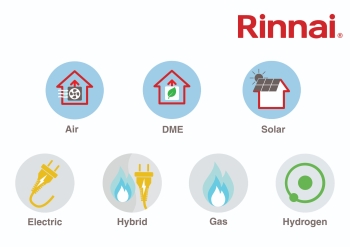Rinnai has welcomed the Department of Energy Security & NetZero’s report on Improving Boiler Standards and Efficiency. The consultancy report focuses on the opinions regarding boiler standards and future hydrogen introduction for installers, manufacturers, academics, and organizations who operate inside the energy industry. Members of the public were also consulted for their views.
Says Operation Director Chris Goggin, “we were happy to have contributed towards this discussion on proposals to strengthen operating standards and potential future hydrogen usage. We are constantly and devotedly committed to advance wider conversations which improve and diversify purchasing options to UK customers.
“Noteworthy points from the consultation included those in favour of hydrogen usage proposed a 2028 mandate on hydrogen-ready boilers, whilst others suggest waiting until 2026 before making any decision on a future mandating timeframe. The report also expressed the firm view that hydrogen-ready boilers should not exceed a size of 45kW,” adds Mr Goggin.
The timescale of hydrogen introduction was a factor emphasised in two notable ways: a decision on hydrogen’s role in domestic heating should be made before the mandating of hydrogen-ready boilers, and that 2026 would be too soon to enforce compulsory hydrogen boiler ownership.
An idea that decision making regarding hydrogen deployment should be made at a local level and constricted to industrial areas was also expressed, as was the further concern relating to the viability of a functioning national hydrogen network.
As part of the consultancy report, a section was reserved for the response of the Department of Energy Security & NetZero government representatives to the concerns raised by parties involved in answering the questions posed. The UK government supplied this statement when responding to hydrogen boiler mandate timelines:
“If a decision is taken in 2026 that hydrogen will play a substantive role in heat decarbonisation, it is our intention to then mandate that domestic-scale gas boilers will be hydrogen-ready from 2030. This is based on feedback from boiler manufacturers that they require at least 4 years to invest in supply chains and convert production processes across all their product ranges.”
Says Rinnai’s Chris Goggin, “We would also like to draw attention to the fact that the boiler upgrade scheme does not provide financial support for hybrid heat pumps, instead preferring to favour technologies that offer greater carbon reductions. We understand that technologies which omit less carbon should be well supported yet feel that hybrid heat pumps, should be recognized as contributing towards decarbonisation especially when considering the nuances of UK domestic and commercial building stock. This recognition could manifest through either financial incentives or legislative support that categorizes hybrid heat pumps as a decarbonising bridge technology that can apply for government subsidies.”
Boiler standards are an issue examined throughout the consultancy report. The UK government proposes that all gas boilers 45kW and under should be capable of modulating their heat output down to 15% of their maximum output without on/off cycling, while operating at least the same useful efficiency as when tested at part load. This boiler standard should be enforced by 2028.
The findings of the consultancy report keep open the strong possibility of future hydrogen deployment as well as aiming to strengthen boiler performance that assists national decarbonisation objectives.
UK customers of energy and all related appliances should purchase low carbon domestic and commercial heating and hot water products from manufacturers who possess an array of items that are already aligned within future and current national energy policy.
Rinnai’s H3 range of products offer hydrogen, hybrid and heat pump technologies to customers concerned with reducing carbon output from their domicile or commercial property.
